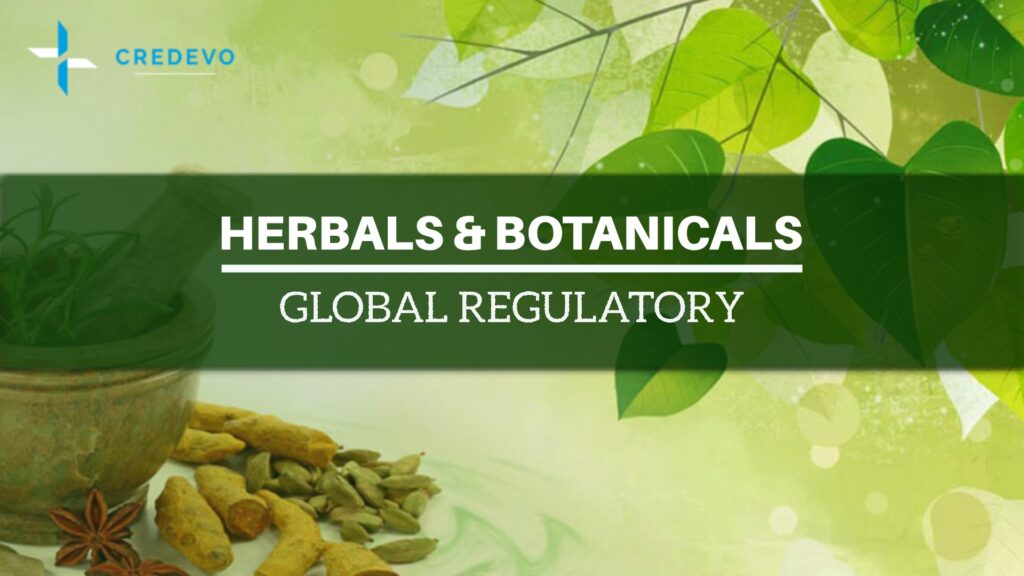Herbals And Botanical Products Regulations

Globally many consider herbs and botanicals to be natural and therefore healthier and gentler than conventional drugs. Currently, 30% of prescription drugs are herbal and botanical drugs. Herbals and botanicals are used for the treatment and improvement of health and well-being. Many countries use herbal and botanical drugs traditionally for many years to generations. The regulation for botanical and herbal products varies from country to county.

Also, the use of herbal and botanical products varies from country to country. Some countries use it as a supplement, some use it for general health while others permit use for medicinal purposes. Many forms, such as tablets, capsules, pills, syrups, etc., are used for selling botanicals and herbals.
So let’s first look at what are botanicals and herbal products.
What are herbal and botanical products?
Botanicals
A botanical refers to a plant or plant part that holds value for its medicinal or therapeutic properties, flavor, and/or scent. Herbs represent a subset of botanicals. Sometimes, products derived from botanicals used to enhance or maintain health, receive the names herbal products, botanical products, or phytomedicines.
Herbal products
Various plant parts, such as leaves, roots, or flowers, yield the active ingredients found in herbal medicines. We classify products derived from plants or botanicals, used for disease treatment or health maintenance, as herbal products, botanical products, or phytomedicines. Additionally, an herbal supplement denotes a product made from plants and intended for internal use.
However, there is a thin negligible layer of difference between herbals and botanicals.
World Health Organization’s (WHO) view on Herbal and Botanical products
The World Health Organization (WHO) has recognized the role of botanicals in traditional herbal medicines and published a series of monographs on selected medicinal plants. These monographs present technical reviews of the quality, safety, and efficacy of commonly used herbal medicines, with the intention to harmonize the use of herbal medicines internationally.
WHO monographs on selected medicinal plants
Herbal and Botanical products market
A report estimated the global botanical ingredients market size at USD 131.5 billion in 2019 and projected a compound annual growth rate (CAGR) of 7.0% from 2020 to 2027. Growing consumer awareness towards health and safety is believed to drive this growth, positively impacting the market for botanical ingredients.
Products like Ginkgo Biloba, ginseng, echinacea, and garlic are the major selling botanical products in the U.S. Ginkgo biloba became popular for its anti-inflammatory and anti-infective properties in the U.S. Ginseng is known for its high content of phenolic compounds, ginsenosides, and saponins, such as carotenoids and carbohydrates and is used for various uses such as Anti-oxidant, control blood sugar, etc.
Regulation of Herbal and Botanical products in various countries
US regulatory
In the USA, the Dietary Supplement Health and Education Act (DSHEA) of 1994 regulates dietary supplements, including botanical food supplements. The FDA does not require approval before marketing dietary supplements in the United States.
However, the DSHEA prohibits manufacturers and distributors of dietary supplements from marketing adulterated or misbranded products. It assigns them the responsibility and discretion to ensure product safety and compliance with labeling requirements.
The FDA mandates that manufacturers notify them of “New dietary ingredients (NDIs)” or ingredients used in dietary supplements that were not marketed in the USA before 1994. Manufacturers must provide information on the identity and safety of the ingredient to the FDA before marketing it.
For more details on the US regulations, click here
Europe regulatory
Companies seeking to bring herbal medicinal products to the market in the EU Member States should follow the national procedures overseen by national competent authorities.
There are three main regulatory pathways to market a herbal medicinal product in the EU Member States:
- Traditional use registration
- No clinical tests and trials on safety and efficacy are required as long as sufficient safety data and plausible efficacy are demonstrated.
- Involves the assessment of mostly bibliographic safety and efficacy data.
- Must have been used for at least 30 years, including at least 15 years within the EU.
- Are intended to be used without the supervision of a medical practitioner and are not administered by injection.
- Well-established use marketing authorization
- Scientific literature establishes that the active substances of the medicinal products have been in well-established medicinal use within the EU for at least ten years, with recognized efficacy and an acceptable level of safety.
- Involves the assessment of mostly bibliographic safety and efficacy data.
- Stand-alone or mixed application
- This requires Safety and efficacy data from the company’s own development or a combination of its own studies and bibliographic data.
Click here to know more about Nutraceutical, Dietary, & Food Supplement Products In Europe
Japan regulatory
Most dietary supplements, including botanical food supplements, fall within the areas of either “Foods in General” or “Foods with Health Claims” with the difference being the presence of health claims on products.
Products classified as “Foods in general” are not subject to pre-market authorizations or notifications. However, the regulation of Foods with Health Claims involves different pathways, categorized as “Foods for Specified Health Uses” (FOSHU), “Foods with Nutrient Function Claims” (FNFC), or “Foods with Function Claims” (FFC). These pathways range from a rigorous and lengthy approval process for FOSHU to shorter pre-market notifications for FFC.
Click here for more detailed information on nutraceutical regulations in Japan
Australia regulatory
In Australia, the regulation of botanical food supplements as “Complementary medicines” is conducted by the TGA through a risk-based tiered approach. Lower-risk medicines are listed on the Australian Register of Therapeutic Goods (ARTG) without therapeutic indication evaluation by regulators. On the other hand, registered medicines undergo evaluation for quality, safety, and efficacy before acceptance.
Know more about complementary medicines regulations in Australia
China regulatory
Chinese market entry regulations have recently revised the regulation of dietary supplements, including botanical food supplements, as “health foods.” A notification-based approach has replaced the previous lengthy registration procedure for basic vitamin and mineral-containing products.
However, extensive testing and premarket approval are still necessary for other health food products. The CFDA has published detailed rules stating that new ingredients used in health food must be supported by a package of toxicological data, including an acute oral toxicity study, 3 genotoxicity assays, and a 28-day oral toxicity study. Based on the outcome of these studies, additional studies such as 90-d oral toxicity studies, teratogenic, and reproductive toxicity studies may also be required.
Know more about China’s drug regulatory
Canada regulatory
Canada regulates botanical food supplements as “Natural health products (NHPs)“. Premarket authorization of NHPs is required, for which detailed information on the product’s medicinal ingredients, source, dose, potency, non-medicinal ingredients, and recommended dose/use is required. Labels are an important tool to assist Canadians in making informed health choices when selecting and using NHPs.
Pre-market authorizations requirements in the above countries
Let’s briefly look at the pre-market authorization requirements in the above-discussed countries.
| Country | Legislation instrument | Pre-marketing authorization requirement |
| USA | Dietary Supplement Health Education Act (DSHEA) 1994 | No |
| European Union | Directive 2002/46/EC of the European Parliament and of the Council of 10 June 2002 on the approximation of the laws of the Member States relating to food supplements | No Botanical ingredients meeting the definition of “novel food” must be first authorized |
| Australia | Therapeutic Goods Act | Yes |
| Japan | Food Sanitation Act (Act No. 233, 1947) | No (for the ‘Foods in general category) |
| Yes (for the ‘Foods with health claims’ category) | ||
| China | Food Safety Law of the People’s Republic of China and | Yes |
| Measures for the Administration of Registration and Recording of Health Food |
Do you require support for the registration of your herbal and botanical products?
Credevo provides expertise in drug product registration, clinical trial regulations, and a wide range of other global services. Please provide your details to connect with us and explore the services we offer.